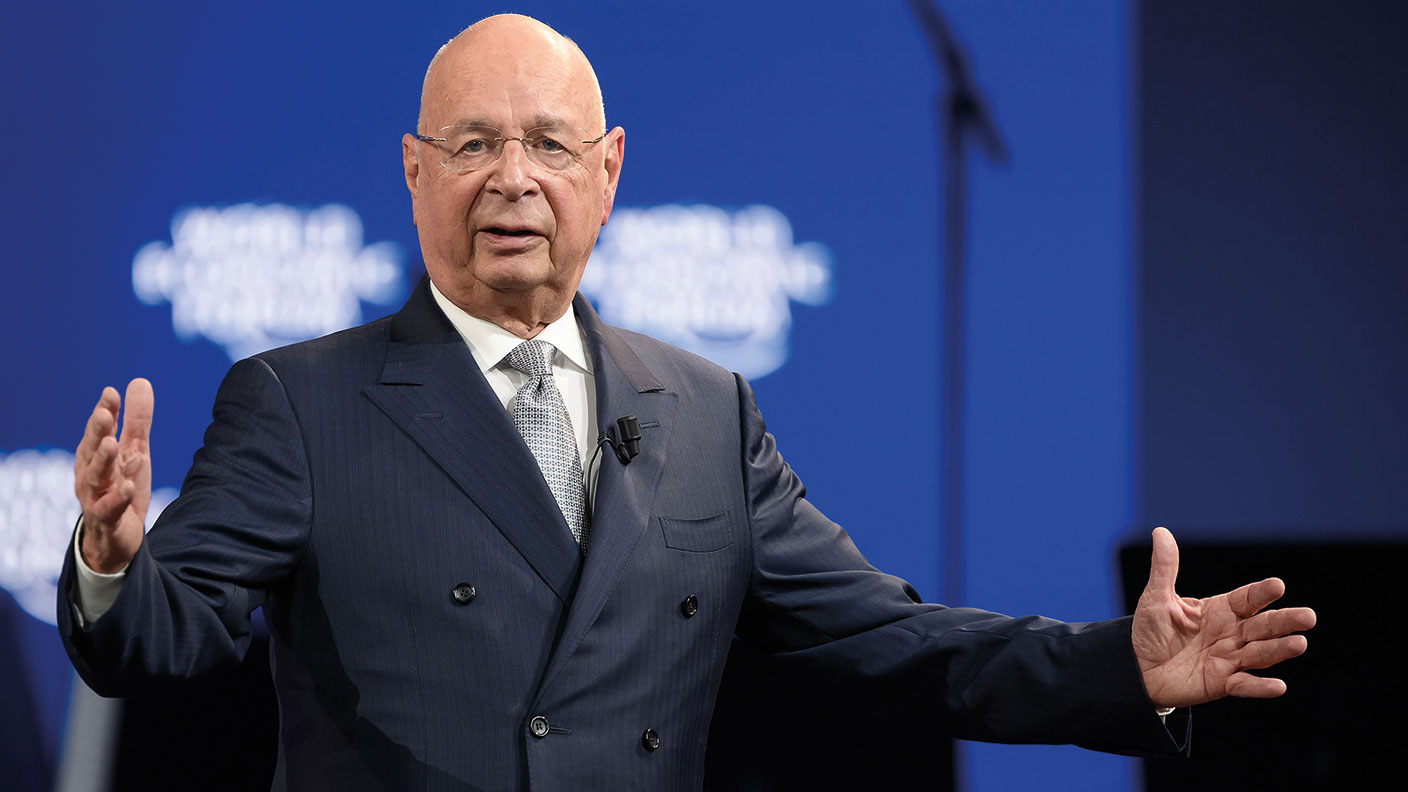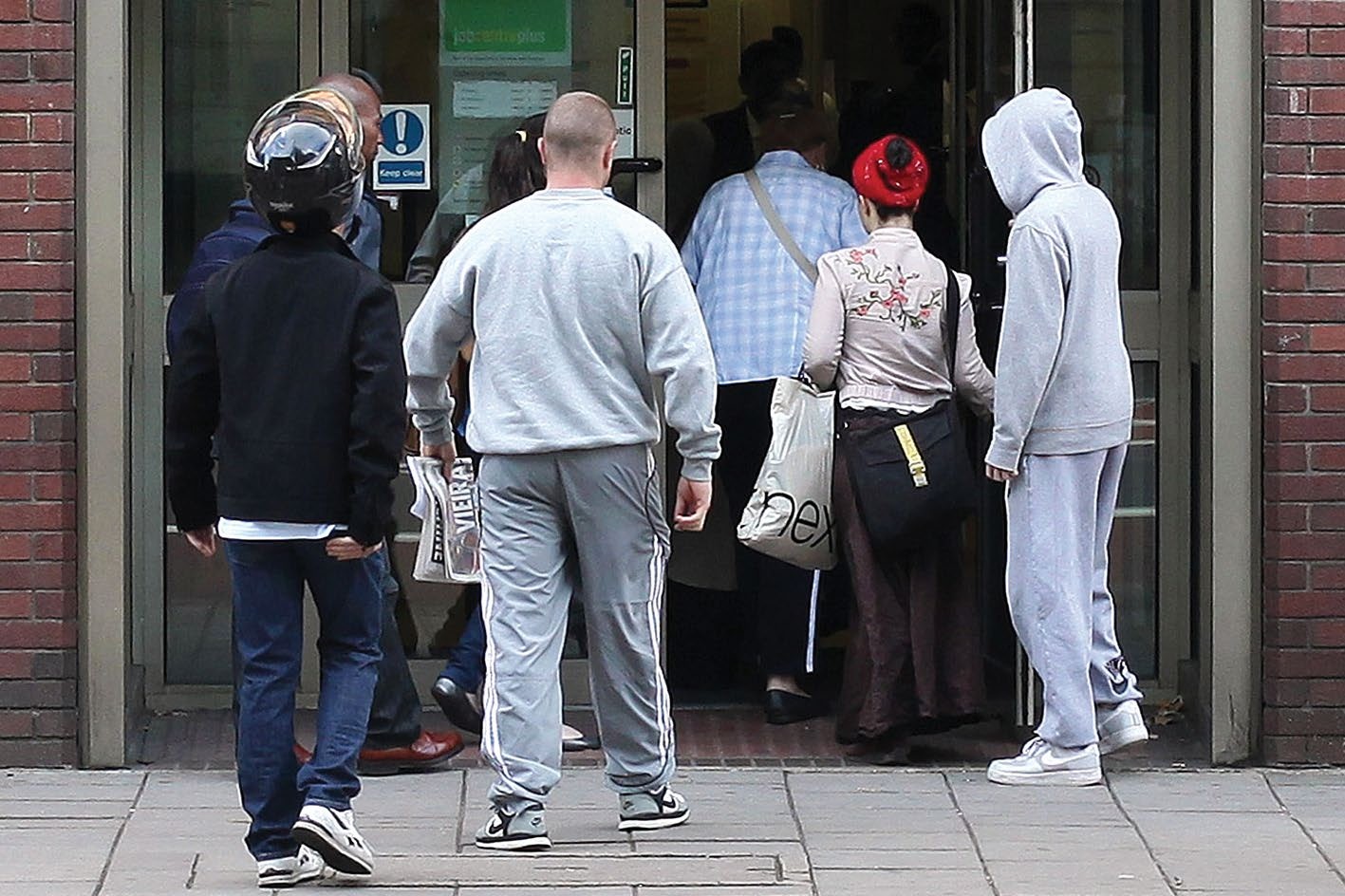The Great Reset: a fresh start or yet another assault on freedom?
The World Economic Forum’s latest big idea is being trumpeted as a new beginning for the global economy. Yet in truth there is nothing new about it – and nothing appealing either. Stuart Watkins explains


Get the latest financial news, insights and expert analysis from our award-winning MoneyWeek team, to help you understand what really matters when it comes to your finances.
You are now subscribed
Your newsletter sign-up was successful
Want to add more newsletters?
A sinister global plot is afoot. It seeks to exploit the coronavirus crisis to remake the world economy, put it under the control of an unaccountable technocratic elite, and impose a new world order under which we shall all be monitored and measured, controlled and commanded, oppressed. That, at least, is a view held in some of the wilder corners of the internet – and by at least one British journalist. Whenever you hear a political leader refer to the need to “build back better” when this crisis is over, or to use it as an opportunity for a “reset”, then you should know that this is a “code phrase for one of the most terrifying and dangerous, globally co-ordinated assaults on liberty and prosperity in the history of mankind”, as James Delingpole puts it on Breitbart.
Delingpole must be worried, as his view was that the victory of Donald Trump in the US presidential election was the only chance we had of halting this catastrophe. Now that Biden has taken office, we must instead look forward to a new world where “your children have no prospects and your life will barely be worth living”. The Great Reset, as the conspiracy is known, “is not a drill… [it is] an imminent, deadly threat of which everyone who cares about freedom, prosperity and national sovereignty should be aware”.
It it is also, however, an unusual kind of conspiracy in that it has been cleverly hidden in plain sight. As Stacey Rudin of the American Institute for Economic Research points out, the lead villain of the piece, Klaus Schwab of the World Economic Forum (WEF), has published a book outlining his plans. Time magazine ran a special feature and cover story on the theme.
Try 6 free issues of MoneyWeek today
Get unparalleled financial insight, analysis and expert opinion you can profit from.

Sign up to Money Morning
Don't miss the latest investment and personal finances news, market analysis, plus money-saving tips with our free twice-daily newsletter
Don't miss the latest investment and personal finances news, market analysis, plus money-saving tips with our free twice-daily newsletter
The WEF itself – the organisation that hosts the annual Davos shindig – has explored the ideas in numerous web pages, videos and online conferences that are freely available to the public. The ideas aren’t even new. They are, as Rudin says, a “rebranded, tightened-up version of the UN’s decades-old Sustainable Development agenda”. Before Covid-19 was discovered, the UN and the WEF had agreed to work together to advance the sustainable development agenda now known as the Great Reset.
A Green New Deal
What kind of ideas are we talking about? The Great Reset is in essence a rebranded Green New Deal (defeated by the US Congress in 2019) and a rebadged advocacy of “stakeholder capitalism” (the increasingly trendy idea that a firm’s managers should be responsible not just to shareholders, but also to vaguely defined “stakeholders”). Schwab has long been hostile to Milton Friedman-style economics, which holds that a company’s only job is to make profits, and believes the Covid-19 pandemic will mark the final death-knell of such “neoliberalism”, says Rudin. Schwab defines “neoliberalism” as “a corpus of ideas and policies… favouring competition over solidarity, creative destruction over government intervention and economic growth over social welfare”. The words chosen there give some hint of the kind of thing Schwab would prefer, which will seem a pleasant aspiration or a socialist mess, depending on which tribe you hail from. Schwab has been pushing such ideas for a long time, but the pandemic has, in his view, provided a window of opportunity for turning the dream into a reality. Schwab has, in fact, long expected a global pandemic and, knowing that such episodes can accelerate societal shifts, has been planning for one. His organisation conducted a “high-level pandemic exercise” in October 2019, four months before the advent of Covid-19.
That people have now for nearly a year been working from home, communicating by Zoom rather than flying around the world, taking cues on what constitutes acceptable behaviour from the state, doing only what is deemed essential work, and happily signing up to be tracked and traced to monitor compliance with state edicts, are all very happy developments from this point of view. They lay the foundations necessary for “building back better”.
To achieve better outcomes, as Schwab explains on the WEF website, “the world must act jointly and swiftly to revamp all aspects of our societies and economics, from education to social contracts and working conditions. Every country, from the United States to China, must participate and every industry, from oil and gas to tech, must be transformed”.
The way to that end is for the state to “steer the market towards fairer outcomes”, using such tools as wealth taxes and new rules over intellectual property, trade and competition; to ensure that investments advance “shared goals”, such as equality and sustainability; and finally to “harness the innovations of the fourth industrial revolution to support the public good”, which means essentially applying new digital technologies to engineer society in a direction deemed to be healthy.
What’s not to like?
It may be hard for those of a left-liberal disposition to see what there is to object to in any of this, so it’s worth listening again to the warnings of prophets of old. Change the odd word here and there and an apposite analysis of the dangers inherent in this seemingly very modern utopia will be found in a book first published in the wake of the second world war. It is not, as Friedrich Hayek argued in The Road to Serfdom, that experts in one field or another cannot identify some social ill, propose a plausible cure, and then put it into effect, using state power to make the medicine go down if necessary.
The problem is rather that there is never any end to the problems to be solved, needs to be met, desires satisfied; yet the resources available to put to those ends, including those of our own minds and attention and energies, are strictly limited. What one person might reasonably value as the supreme goal will conflict with a million others who value things rather differently. So how do you decide on priorities? It is not so much that it is hard for state bureaucrats to solve this problem – rather, it’s impossible. Policymakers would need access to an all-inclusive scale of values. And as Hayek puts it, “Not only do we not possess such an all-inclusive scale of values: it would be impossible for any mind to comprehend the infinite variety of different needs of different people which compete for the available resources and to attach a definite weight to each”.
Scales of value can “exist only in individual minds”, which are different from and inconsistent with those in other individual minds. In a society where such complexities are navigated by individuals acting on their own account within a system of free markets, a solution to this infinitely complex problem arises spontaneously in a social order that is not planned, but the outcome of the activity of free individuals associating freely for their own purposes. If the state, or some other collectivist entity, tries to blindly impose its own values, its own solutions, in the name of some superior scale of values, the result can only be an erosion of liberty and greater poverty and misery for all. History would seem to amply support these claims.
When all is going relatively well, such arguments might sound excessively philosophical and remote from everyday, practical concerns. The response of states around the world to the pandemic, however, brought home once again their vital importance and relevance. Against the system of values that puts a prime value on controlling a virus and protecting certain vulnerable groups from one illness, and which turns to expert modellers and epidemiologists for prescriptions on the best way forward, there are billions of people worldwide with other values, other ideas, other goals.
Hayek and Ludwig von Mises’ arguments against central planning specifically concerned the need for prices of marketable goods, and hence of private ownership, but as Patrick Barron of the Mises Institute points out, the arguments apply more broadly. “The government’s response to Covid-19 assumes that it knows everyone’s personal risk hierarchy and can tailor an appropriate public response. This is as impossible as knowing values in a socialist commonwealth.” The social planners now coalescing around the ideas of the Great Reset are different from those Hayek was taking aim at. The ideology is not socialist or fascist, but technocratic; the means not brute force, but behavioural “nudges”. But the pertinent arguments still apply. Who decides what will be the goals aimed at? Schwab’s work is full of speculation about what “we” can achieve. Who are “we”?
Worse than a conspiracy
Still, as Hayek argued, it is a mistake to see those who seek power with rather different ideas about how society could be managed and planned for the common good as a malevolent conspiracy of evildoers. It is natural that well-intentioned, highly intelligent experts and intellectuals, whose job is to apply reason to solve problems, wish to bring the power of the natural sciences to bear on the real issues that concern them.
The trouble is that such methods, which deal with the laws governing the interactions between inert matter, are inappropriate for solving social problems, since what we are dealing with is not inert matter at all, but living minds with a will, morals, conscience, desires, values and ideas of their own. The difficulties involved in herding cats might spring to mind – but imagine a herder with state power at his disposal, and spare a thought for the misery of the cats.
The dangers inherent in the ideas of the Great Reset, then, are more troubling than that presented by any conspiracy since what is called for is not an effort to expose and stop the conspirators, but rather a challenge to ideas that are in effect the official religion of our times – Hayek called it “scientism”. And it’s very hard to do that without being dismissed as a heretic.
Rather than a conspiracy, what we have is an “elite consensus on ‘the way ahead’”, as Ben Sixsmith puts it in The Spectator. “One critic has called Davos an ‘ideological synchronisation environment for individuals, corporations, and governments to keep on the same page’. That is different from conspiracy – but not that different. When bad ideas are adopted globally by some of the most powerful people in the world, the effect can be the same. The Great Reset might be all the more terrifying for not being a sinister plot.”
For more on this topic, see moneyweek.com/great-reset
Get the latest financial news, insights and expert analysis from our award-winning MoneyWeek team, to help you understand what really matters when it comes to your finances.

Stuart graduated from the University of Leeds with an honours degree in biochemistry and molecular biology, and from Bath Spa University College with a postgraduate diploma in creative writing.
He started his career in journalism working on newspapers and magazines for the medical profession before joining MoneyWeek shortly after its first issue appeared in November 2000. He has worked for the magazine ever since, and is now the comment editor.
He has long had an interest in political economy and philosophy and writes occasional think pieces on this theme for the magazine, as well as a weekly round up of the best blogs in finance.
His work has appeared in The Lancet and The Idler and in numerous other small-press and online publications.
-
 What do rising oil prices mean for you?
What do rising oil prices mean for you?As conflict in the Middle East sparks an increase in the price of oil, will you see petrol and energy bills go up?
-
 Rachel Reeves's Spring Statement – live analysis and commentary
Rachel Reeves's Spring Statement – live analysis and commentaryChancellor Rachel Reeves will deliver her Spring Statement on 3 March. What can we expect in the speech?
-
 UK small-cap stocks ‘are ready to run’
UK small-cap stocks ‘are ready to run’Opinion UK small-cap stocks could be set for a multi-year bull market, with recent strong performance outstripping the large-cap indices
-
 The scourge of youth unemployment in Britain
The scourge of youth unemployment in BritainYouth unemployment in Britain is the worst it’s been for more than a decade. Something dramatic seems to have changed in the labour markets. What is it?
-
 In defence of GDP, the much-maligned measure of growth
In defence of GDP, the much-maligned measure of growthGDP doesn’t measure what we should care about, say critics. Is that true?
-
 Reach for the stars to boost Britain's space industry
Reach for the stars to boost Britain's space industryopinion We can’t afford to neglect Britain's space industry. Unfortunately, the government is taking completely the wrong approach, says Matthew Lynn
-
 "Botched" Brexit: should Britain rejoin the EU?
"Botched" Brexit: should Britain rejoin the EU?Brexit did not go perfectly nor disastrously. It’s not worth continuing the fight over the issue, says Julian Jessop
-
 'AI is the real deal – it will change our world in more ways than we can imagine'
'AI is the real deal – it will change our world in more ways than we can imagine'Interview Rob Arnott of Research Affiliates talks to Andrew Van Sickle about the AI bubble, the impact of tariffs on inflation and the outlook for gold and China
-
 Tony Blair's terrible legacy sees Britain still suffering
Tony Blair's terrible legacy sees Britain still sufferingOpinion Max King highlights ten ways in which Tony Blair's government sowed the seeds of Britain’s subsequent poor performance and many of its current problems
-
 How a dovish Federal Reserve could affect you
How a dovish Federal Reserve could affect youTrump’s pick for the US Federal Reserve is not so much of a yes-man as his rival, but interest rates will still come down quickly, says Cris Sholto Heaton